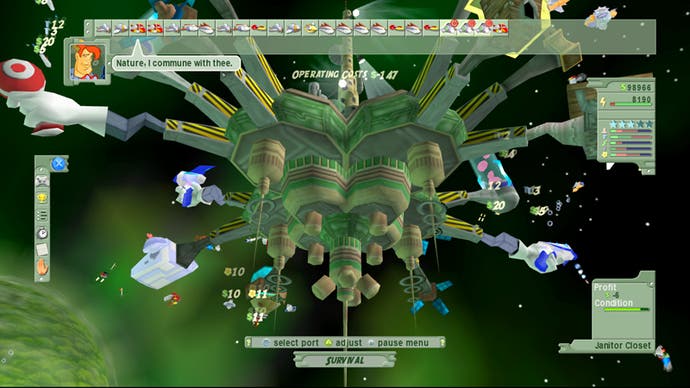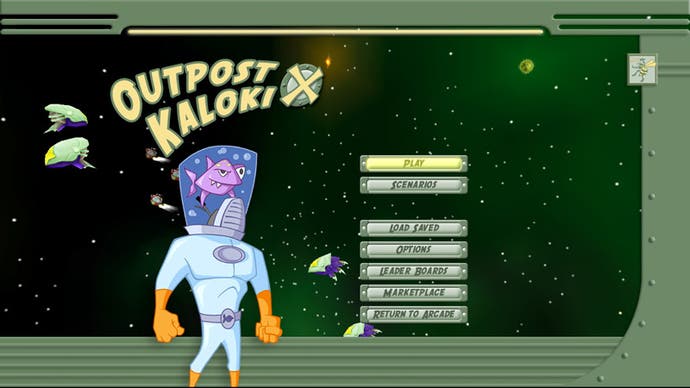Outpost Kaloki X
Well, reviews take a while to build too.
I'm looking at the release date on this. It says "November 22nd, 2005". Fortunately this is a game about balancing the needs of trade-hungry space-everymen against power consumption, and trying to squeeze out as much value as you can when you can - a soon-reached conclusion being that sometimes it's better to wait until the timing's on your side.
Although sometimes you do just forget, obviously.
Even nestling in the varied bounty of Xbox Live Arcade, Outpost Kaloki X stands out a light-year away. It's a simple empire-building game, effectively, where you take control of a succession of quirky trading outposts in space and build up a range of expansions - shops, labs and entertainment attractions for the most part - while trying to fulfil varied objectives.
Initially it looks a bit complex, with its three separate menu bars, various meters and ever-changing numbers - and the inclusion of a level-countdown doesn't exactly alleviate anxiety - but a sensibly constructed first few levels walk you through everything without confusing. The bar along the top shows you ships in the area, and is, with the exception of occasions when a dignitary or other vital character pops up with something to say, mostly for show, while the bar on the left is mostly game-menu options and, apart from a helpful current-objectives button, mostly ignorable.
The section on the right and the outpost in the centre of the screen are where you want to focus. Looking to the right shows you your present cash-total, the amount of power being consumed and the excess available, the countdown, and a list of the locals' current needs and how satisfied they are. The idea is to keep the outpost's capacity slightly ahead of the bright green that shows current usage. You do this by swinging the station in the centre of the screen around with the right analogue to take a look, and using the left analogue or d-pad to select one of its expansion bays, which can then be built up by hitting A and selecting from a list of options.

Adding to the difficulty are several things. A limited number of expansion ports available to build onto means that you need to be practical. As do the constant running costs of a facility with lots of expansions, which chip away at your cash-total and become quite problematic if you've built too fast too quickly. Fortunately you can scrap any port and build something else, or just leave it unoccupied, but you won't make back all the money you spent, obviously. Better to plan ahead.
Other issues present themselves gently and generally without the need to prompt the player. Maintenance is a pretty obvious one - everything degrades over time, so after a few levels you're introduced to another category of expansion that suits that job. The need to keep running costs low is best emphasised in an early story mission where you need to create a huge power surplus - gradually adding bigger power supplies moves you closer to this, but affects your bottom line, so it's better to build simple and quickly to satisfy the needs of passing ships and then blow the profits on a raft of power generators once you've hit a certain level. That satisfies your objectives and ends the level - it doesn't matter whether the whole thing's likely to nose-dive into the red once you've buggered off.

Each of the several expansions you have at your disposal is available at several technological levels. First you have chemistry labs, for example, but then the game's insatiable scientific community need more, so you can opt for the stately observatory for your next upgrade. There's a rudimentary tech-tree behind all of this, with certain things, like the generator power station, only available once you've built other things like a hall of records. Others still, like the spy-radio facility, can only be built once you've built something and somebody's passed you the plans for it. This happens quite intuitively, and there are other mission-specific expansions to build once people supply you the information - usually in return for fulfilling one of the early mission objectives.
Although very simple, what's compelling about Kaloki (apart from the excellent light-jazz going on in the background and the Futurama styling) is that instead of being some hideously complex real-time strategy game or Civlization wannabe, it's more of a simple logic puzzle. It's the word-jumble of strategy games. Quirks are minor (like the fact it often tells you that you need so-many dollars, and you get them, only for it to tell you that you need so-much power too - why not point that out at the same time?) and tolerable.

The only thing that really gets in the way is the repetitive cycle of unlocking the same things over and again. After a couple of handfuls of levels you'll probably tire of that, since you'll already know the unlock-structure and you'd prefer something new to worry about.
Persevere though and the game continues to entertain with tighter winning conditions and solutions that prove trickier to extract, forcing you to pay attention to more of the details - like the option to micromanage expansions by tweaking the way they work. In terms of length, you'll find a pair of single-player modes along with a host of scenarios, and with 12 achievements to hunt down, some gamer-pictures to unlock (like Cloning Clyde, Ninja Bee makes a good fist of unlockables here, even if the core gameplay can become rather monotonous) and free downloadable content, there's much to do.
It probably won't occupy you for more than a few evenings of play, but you'll enjoy them, and at 800 Microsoft points it's an affordable alternative to the full-price games your bank manager's probably worrying about and the other Live Arcade games. There's much better strategy fare on the PC, but even nine months later it's still flying solo through relatively unexplored space on Xbox 360 - and if you give it a few minutes you'll probably find that you want to give it a few hours.
Outpost Kaloki X is out now on Xbox Live Arcade, and costs 800 Microsoft points.

